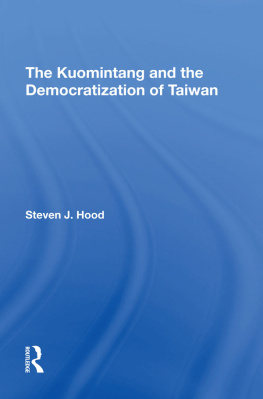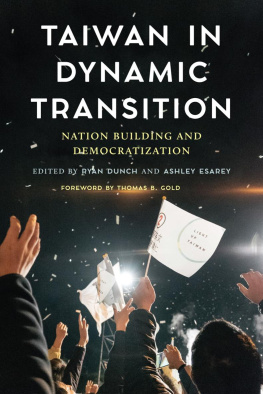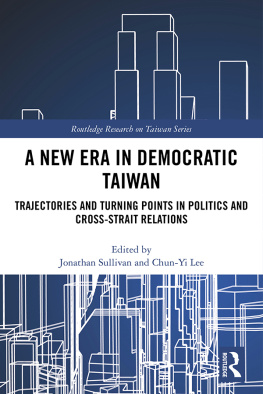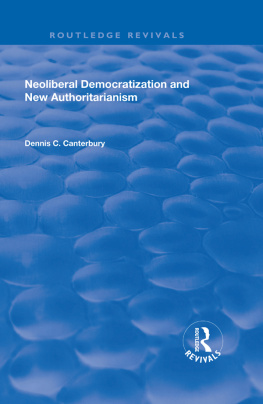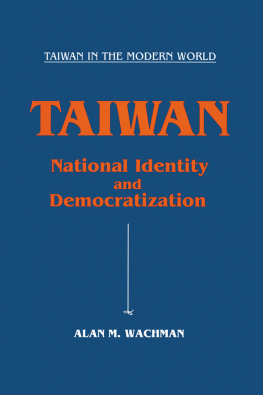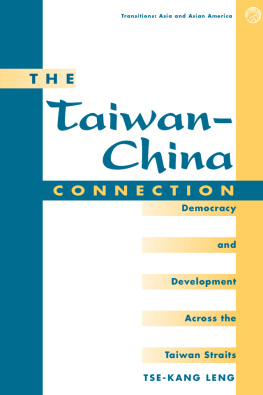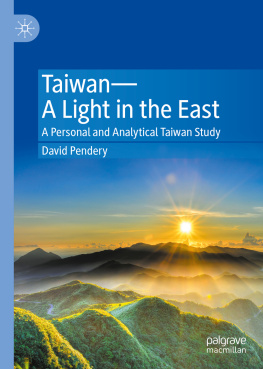First published 1997 by Westview Press
Published 2019 by Routledge
52 Vanderbilt Avenue, New York, NY 10017
2 Park Square, Milton Park, Abingdon, Oxon OX14 4RN
Routledge is an imprint of the Taylor & Francis Group, an informa business
Copyright 1997 Taylor & Francis
All rights reserved. No part of this book may be reprinted or reproduced or utilised in any form or by any electronic, mechanical, or other means, now known or hereafter invented, including photocopying and recording, or in any information storage or retrieval system, without permission in writing from the publishers.
Notice:
Product or corporate names may be trademarks or registered trademarks, and are used only for identification and explanation without intent to infringe.
Library of Congress Cataloging-in-Publication Data
Hood, Steven I.
The Kuomintang and the democratization of Taiwan / by Steven J.
Hood.
p. cm.
Includes bibliographical references and index.
1. Chung-kuo kuo min tang. 2. TaiwanPolitics and
government1988- 3. DemocracyTaiwan. I. Title.
JQ1519.A5C645 1997
324.25108309049dc20
96-33346
CIP
ISBN 13: 978-0-367-29341-3 (hbk)
In the last few years there have been several important political studies focusing on Taiwan. This has been a welcome development. Taiwans lack of diplomatic relations with other countries and mainland Chinas relative prominence in the world contributed to the lack of attention given to Taiwan. Some scholars have had an aversion to studying Taiwan because of their dislike for Taiwans political regime.
This books general focus is on this regime. I consider the role of the Nationalist Party of China (Kuomintang, or KMT) in the democratization of Taiwan. The study has filled an interest I have had in determining to what degree the KMT was the villain it is sometimes portrayed to be, and the embodiment of the political and moral good partisans have claimed it to be. I have found the party to be a fascinating organization of contradictory purposes and achievements. Its reputation is marred by ineptitude and by brutal acts of repression. It nevertheless still managed an incredible feat of economic modernization on Taiwan and eventually became a proponent of democracy.
I focus on the role of KMT party elites in the democratization process, which I believe is the most neglected aspect of studies done on the political transformation of Taiwan. While I do not question the heroic struggles of the political opposition in Taiwan, my attempt is to direct attention to the significant effort Kuomintang leaders took to thwart democracy, and later, smooth the way for democratic reforms. It is important to understand the KMTs evolution from a Leninist party-state to a fractious party in a competitive political system. While Taiwans experiment with democratization mirrors the experiences of studies done on countries in Latin America and Southern Europe, important differences exist.
Latin American and European case studies focus on conflict, decisions, compromises, and accidents that result from relatively short-term confrontations between elites in the opposition and softliners and hardliners within authoritarian regimes. These factors are important in the Taiwanese case as well, but other aspects are more important. Taiwans democratization has been a long-term process of elites wrestling within the confines of political institutions. For this reason, democratization came about through reform of the KMT party-state, Taiwans representative bodies, and political ideology. Driven by a subethnic split between Taiwanese and mainland-born Chinese and a desire for a liberal regime, the opposition was the catalyst for putting the reform agenda in motion. These reforms liberalized the Kuomintang and the state simultaneously. For this reason, understanding the democratization of Taiwan requires an in-depth study of the Kuomintang.
Those who have done research on Taiwan-related topics know of the difficulty in finding credible sources. While Western scholarship on Taiwan is available, Chinese language sources are limited and ofttimes lack credibility. Pre-1989 writings on the Kuomintang are mostly the products of prominent party figures or those sympathetic to the party. Many of these materials lack scholarly development and are most often idealized accounts rather than accurate portrayals of political life in Taiwan under KMT rule. Recent works are better. They reflect the political polarization that has driven the forces of democracy, though they still lack theoretical development. Press coverage on political events in Taiwan, though greatly improved, is often too speculative. The Kuomintang archives proved helpful in providing early party documents, though the KMT Historical Commission has kept nearly all party documents dealing with Taiwan closed.
For these reasons, I relied heavily on interviews of scholars, party leaders, government leaders, journalists, members of the opposition, and business owners to fill in gaps where I thought the literature was still incomplete. Most of the interviews were conducted during spring and summer 1993. I am grateful to the Council of International Exchange of Scholars and the Fulbright Committee for awarding a grant to conduct interviews and archival research in Taiwan.
Several individuals in Taiwan helped me set up interviews. Johnny (Jennan) Sand of the KMT Cultural Affairs Department and Li Yun-han of the KMT Historical Commission made many of the initial contacts with party officials for me. Susanna Su called upon personal acquaintances, giving me access to several top-level officials. Michael and Jennifer Chi arranged lunch meetings and other contacts with Democratic Progressive Party legislators and party officials. To each of these individuals I express my sincere thanks. Without their help, many of my interviews would not have been possible.
I am grateful to factional leaders and local party workers in the Taipei City, Ilan County, and Tao Yuan County party offices for their time in helping me understand local party organizations and their relationship to KMT party central. Several professors spent many hours with me discussing all aspects of Taiwanese politics. Professor Hu Fo, Chu Yun-han, and Lu Ya-li of National Taiwan University helped sort-out the intricacies of Kuomintang factions. Professor Yang Tai-shuenn met with me on several occasions. His analysis of the political culture of Taiwan and the strengths and weaknesses of Taiwans political system helped me assess the strength of democratic reforms in Taiwan.
In writing the book, I benefitted immensely from the comments of prominent scholars who know Taiwan well. Professors Andrew Nathan, Robert Scalapino, and Tun-jen Cheng all read drafts of this book and offered timely criticisms and suggestions. Their efforts greatly improved the quality of my work. I also received help from Professors Alan P.L. Liu, Karl Fields, and Paul Stern on the theoretical development of the book. Their comments early in the writing of the manuscript were invaluable. An anonymous reader at Westview made some helpful comments that led to a clearer analysis. Finally, I am grateful to my wife, Mary, for her reading of drafts, painstaking efforts to sharpen my writing skills, and enthusiastic support of all my endeavors.
Steven J. Hood

